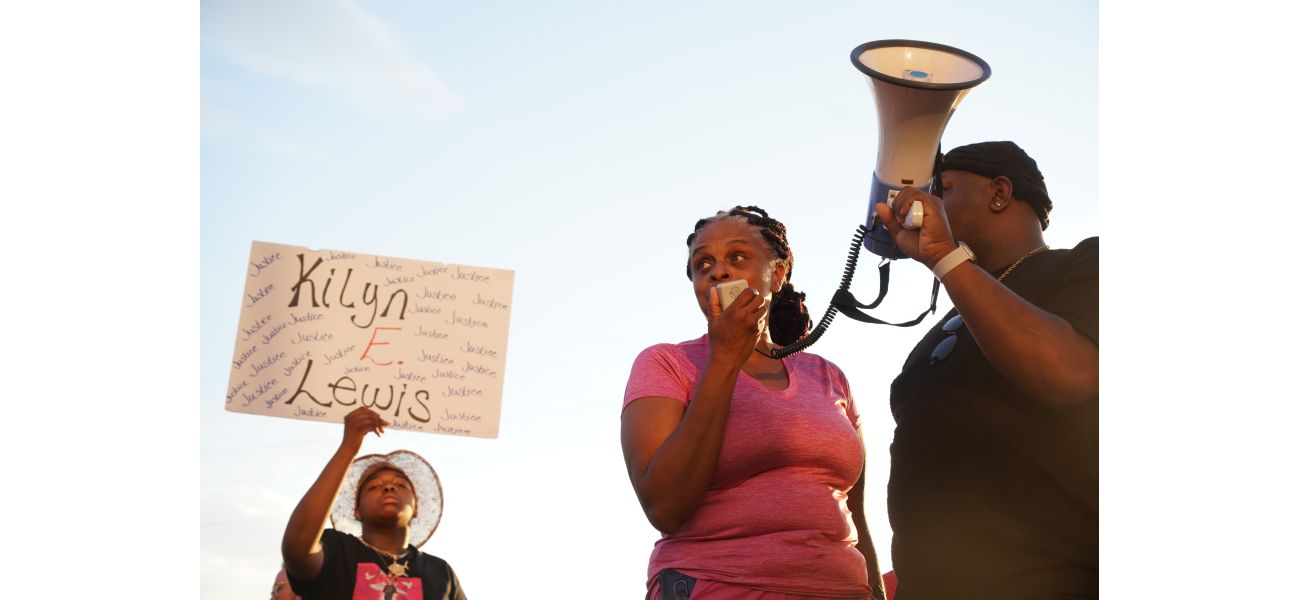Aurora police watchdog report raises concerns about the fatal shooting of Kilyn Lewis.
The report stated that APD needs to assess if their decision to not use less lethal options aligns with their policies and if a different approach could have led to a better outcome.
October 21st 2024.

It has been almost five months since the tragic incident where an Aurora police officer shot and killed an unarmed Black man while attempting to serve an arrest warrant. However, the city's independent consent decree monitor has recently brought up more concerns about the circumstances surrounding his death.
According to body camera footage, Kilyn Lewis, a 37-year-old man, had his hands raised in surrender when SWAT officer Michael Dieck fired a fatal shot outside an apartment complex on May 23. Lewis passed away two days later from the gunshot wound. His father, Robert, spoke out at a rally last week, saying, "I may be just one voice, but I stand for my son and he did not deserve to die like that."
While Lewis was a suspect in a first-degree attempted murder case in Denver, he was unarmed at the time of the shooting. The independent consent decree monitor was established after the death of Elijah McClain, with the goal of improving the use of force by Aurora officers and reducing racially biased policing. The city hired IntegrAssure, a Florida-based firm specializing in overseeing police departments, as their consent decree monitor.
In a recent report, IntegrAssure raised several critical questions for the Aurora Police Department to address in their administrative review of the shooting and Lewis' death. The monitor questioned why the SWAT team was involved in executing a warrant from Denver and why they did not use any less lethal options when attempting to arrest Lewis. They also raised concerns about the officer who shot Lewis being retained by the police department and the SWAT team despite being involved in previous shootings.
The report stated, "The tactics used during the high-risk stop, including the decision to approach the subject without cover and without a less lethal option, require a thorough examination... The officer who fired his weapon has been with the department for 12 years and on the SWAT team for 8 years, and has been involved in prior shootings."
The monitor also questioned the selection criteria for officers assigned to SWAT operations and the retention policies for SWAT team members, given Dieck's history of involvement in shootings. Additionally, they questioned whether the SWAT team confirmed all the facts related to the warrant before engaging with Lewis, as it was a Denver case, and if their involvement was necessary and appropriate.
According to the body camera footage, the SWAT team did not use or consider less lethal options against Lewis. The monitor officials stated in the report that the police department must evaluate whether this decision was consistent with their policies and best practices, and if a different approach could have resulted in a better outcome.
Despite the Arapahoe County District Attorney John Kellner not filing charges against Dieck for Lewis' death, the police department is conducting an administrative review and force review board of the shooting. In a decision letter released earlier this month, Kellner stated that Dieck reasonably believed there was an imminent danger of death or serious bodily injury, justifying the use of deadly force under Colorado law.
Kellner also presented the case to a grand jury, which declined to further investigate. Aurora Police Department public information officer Matthew Longshore stated, "There is always room for us to review our policies, procedures, and best practices in law enforcement, and we will continue to do so and make necessary changes."
According to body camera footage, Kilyn Lewis, a 37-year-old man, had his hands raised in surrender when SWAT officer Michael Dieck fired a fatal shot outside an apartment complex on May 23. Lewis passed away two days later from the gunshot wound. His father, Robert, spoke out at a rally last week, saying, "I may be just one voice, but I stand for my son and he did not deserve to die like that."
While Lewis was a suspect in a first-degree attempted murder case in Denver, he was unarmed at the time of the shooting. The independent consent decree monitor was established after the death of Elijah McClain, with the goal of improving the use of force by Aurora officers and reducing racially biased policing. The city hired IntegrAssure, a Florida-based firm specializing in overseeing police departments, as their consent decree monitor.
In a recent report, IntegrAssure raised several critical questions for the Aurora Police Department to address in their administrative review of the shooting and Lewis' death. The monitor questioned why the SWAT team was involved in executing a warrant from Denver and why they did not use any less lethal options when attempting to arrest Lewis. They also raised concerns about the officer who shot Lewis being retained by the police department and the SWAT team despite being involved in previous shootings.
The report stated, "The tactics used during the high-risk stop, including the decision to approach the subject without cover and without a less lethal option, require a thorough examination... The officer who fired his weapon has been with the department for 12 years and on the SWAT team for 8 years, and has been involved in prior shootings."
The monitor also questioned the selection criteria for officers assigned to SWAT operations and the retention policies for SWAT team members, given Dieck's history of involvement in shootings. Additionally, they questioned whether the SWAT team confirmed all the facts related to the warrant before engaging with Lewis, as it was a Denver case, and if their involvement was necessary and appropriate.
According to the body camera footage, the SWAT team did not use or consider less lethal options against Lewis. The monitor officials stated in the report that the police department must evaluate whether this decision was consistent with their policies and best practices, and if a different approach could have resulted in a better outcome.
Despite the Arapahoe County District Attorney John Kellner not filing charges against Dieck for Lewis' death, the police department is conducting an administrative review and force review board of the shooting. In a decision letter released earlier this month, Kellner stated that Dieck reasonably believed there was an imminent danger of death or serious bodily injury, justifying the use of deadly force under Colorado law.
Kellner also presented the case to a grand jury, which declined to further investigate. Aurora Police Department public information officer Matthew Longshore stated, "There is always room for us to review our policies, procedures, and best practices in law enforcement, and we will continue to do so and make necessary changes."
[This article has been trending online recently and has been generated with AI. Your feed is customized.]
[Generative AI is experimental.]
0
0
Submit Comment





